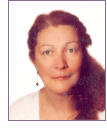|
 In June 1993, two
years after I had a stroke, I wrote this as part of my rehab and
counselling regimen at the Rehab Hospital in Ottawa, Ont. I gave
copies to my doctors and parents, and filed it away. In June 1993, two
years after I had a stroke, I wrote this as part of my rehab and
counselling regimen at the Rehab Hospital in Ottawa, Ont. I gave
copies to my doctors and parents, and filed it away.
I came across it during a filing cabinet purge, and though I've
added two cents' worth here and there, and an update at the end,
the rest stands.
It's February 11, 2017, and I have no significant changes to make. Just taking a trip down short-term-memory lane. Yes, that's still an issue. I've worked as a writer/editor with Royal Canadian Air Force public affairs for a while now, and was in the Minister of National Defence's writing unit before that, so I guess it's not much of an issue.😉 Cheerio.
 Two main types of strokes happen in the brain – hæmorrhagic strokes (bleeds) and ischæmic strokes (blockages of arteries). Two main types of strokes happen in the brain – hæmorrhagic strokes (bleeds) and ischæmic strokes (blockages of arteries).
A blockage (most often due to a blood clot) in an artery
causes damage to the area of the brain
deprived of blood and therefore oxygen. A bleed causes damage in
two areas – the area of the brain deprived of blood/oxygen, and
the area where the bleed occurs. There, the blood builds up and
puts pressure on—sometimes to the point of permanently damaging—the
surrounding brain tissue.
I sometimes refer to what happened to me as a "stroke",
and sometimes as a "bleed". In fact, an artery in my brain burst.
No one knows whether I had an aneurysm or whether a healthy artery
gave way; either way, it was a hæmorrhagic stroke, or bleed.
Several tests I've had over the years have revealed that an aneurysm burst. It makes sense because for all my life I had very bad headaches/migraines, and really have not had a full-blown headache, let alone a migraine, since. Release of pressure, I guess.
 I
have not named the people I talk about—family members,
friends, care-givers—not because they are not important to
me, but because I choose to allow them anonymity. I
have not named the people I talk about—family members,
friends, care-givers—not because they are not important to
me, but because I choose to allow them anonymity.

July 2004 – 50 First
Dates
I have seen 50 First
Dates, starring Drew Barrymore and Adam Sandler. Barrymore's
character has brain damage that results in short-term memory lasting
only as long as she is awake; every morning, the previous
day has disappeared from her memory. The "science" of it
is in the neighbourhood of valid, for it is during sleep that short-term memories
become long-term memories.
It's certainly not the best movie I've seen, and yet I've
seen it three times. I'll buy it, simply because the kindness shown
Barrymore's character by family members, friends and acquaintances moves
me terribly, and the wicked sharp humour about brain damage delights
me terribly. Someone involved with the movie—George
Wing (writer) or Peter Segal (director)—must have had some
experience with brain damage, because both of these elements are
so well and accurately presented.
Kindness is the single most important slice of the
care needed by brain-damaged persons during their recovery/adaptation.
50 First Dates is, if nothing else,
a guide to best behaviour for family and friends of anyone experiencing
short-term memory problems. While we quickly recognize that the
father, brother, and friends have not come up with the best method
of enabling her life (rather than expand her existence, they merely
maintain it), we also recognize it as a solution born of kindness,
utter selflessness and love.
And having short-term memory problems can be hilarious.
Ten-second Tom might be stretching it a bit, but for people with
a short-term memory deficit, the "Who's on first?" routine, and
funnier, is merely their existence. I know. I've been there. I had a lot of fun with it... they tell me. : )

July 2008 – Jill Bolte Taylor
My dear friend Nathalie
Lauzon, Ottawa/Gatineau photographer, writer, poet
and public affairs guru, sent me a link to a talk given
by Jill
Bolte Taylor. Dr. Taylor experienced the same brain
injury I did, at the same age. She describes having the
stroke with so much more clarity and eloquence, and humour,
than I've ever been able to. Thank you, Nathalie.

|